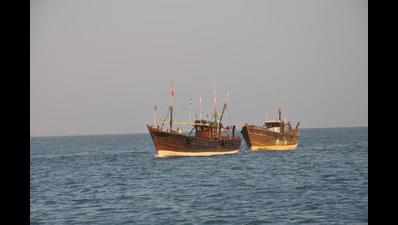- News
- City News
- rajkot News
- Fishermen body calls for ‘no arrest policy’ along IMBL
Trending
This story is from December 29, 2016
Fishermen body calls for ‘no arrest policy’ along IMBL
The Porbandar Fishermen Boat Association (PFBA) has urged the Union government to push for ‘no arrest policy’ for traditional fishermen along the International Maritime Border Line (IMBL) with Pakistan in the Arabian Sea.

Representative image
RAJKOT: The Porbandar Fishermen Boat Association (PFBA) has urged the Union government to push for ‘no arrest policy’ for traditional fishermen along the International Maritime Border Line (IMBL) with Pakistan in the Arabian Sea.
The fishermen body has written a letter to Prime Minister Narendra Modi in this regard and also demanded release of over 200 boats that are in good condition to sail back to Gujarat, from custody of Pakistan authorities.
Welcoming the decision of Pakistan government to release 439 Gujarat fishermen, PFBA president Bharat Modi requested the Indian government to reciprocate the gesture by releasing Pakistan Fishermen in Indian jails. “With release of 439 fishermen, only 50-55 fishermen remain in jails of Pakistan,” Bharat Modi said.
“We request you (PM) to push for ‘No Arrest Policy’ (along the international marine border in the Arabian Sea) for traditional fishermen. It will help the fishing community grow,” Modi said in a letter to PM and Union minister for external affairs Sushma Swaraj.
The fishermen association further said that there was an urgent need to revive the India-Pakistan Judicial Committee on Prisoners that help in release of prisoners from both countries. The committee that comprises of retired judges of both countries also looks after the condition of prisoners and raises issues if any with the respective government.
The fishermen body has written a letter to Prime Minister Narendra Modi in this regard and also demanded release of over 200 boats that are in good condition to sail back to Gujarat, from custody of Pakistan authorities.
Welcoming the decision of Pakistan government to release 439 Gujarat fishermen, PFBA president Bharat Modi requested the Indian government to reciprocate the gesture by releasing Pakistan Fishermen in Indian jails. “With release of 439 fishermen, only 50-55 fishermen remain in jails of Pakistan,” Bharat Modi said.
“We request you (PM) to push for ‘No Arrest Policy’ (along the international marine border in the Arabian Sea) for traditional fishermen. It will help the fishing community grow,” Modi said in a letter to PM and Union minister for external affairs Sushma Swaraj.
He further said, “Pakistan was supposed to send 22 boats seized by the Pakistan Marine Security Agency (PMSA) this year, but it has not yet sent a single boat. We believe that there are nearly 200 boats that can sail back to India after minor repairs. We request you to take up the matter with the Pakistan government at the earliest.” Modi added that in all, over 900 boats have been seized by the PMSA over the years.
The fishermen association further said that there was an urgent need to revive the India-Pakistan Judicial Committee on Prisoners that help in release of prisoners from both countries. The committee that comprises of retired judges of both countries also looks after the condition of prisoners and raises issues if any with the respective government.
End of Article
FOLLOW US ON SOCIAL MEDIA










